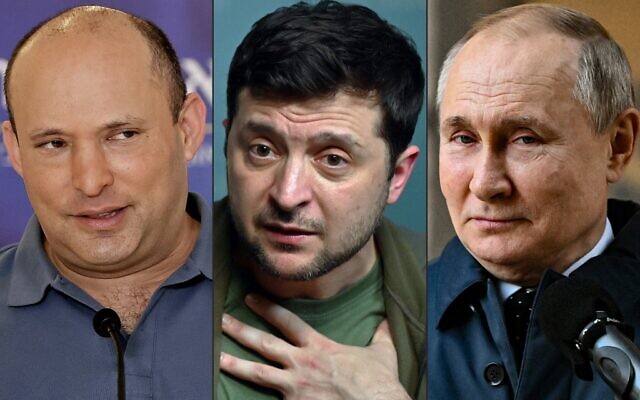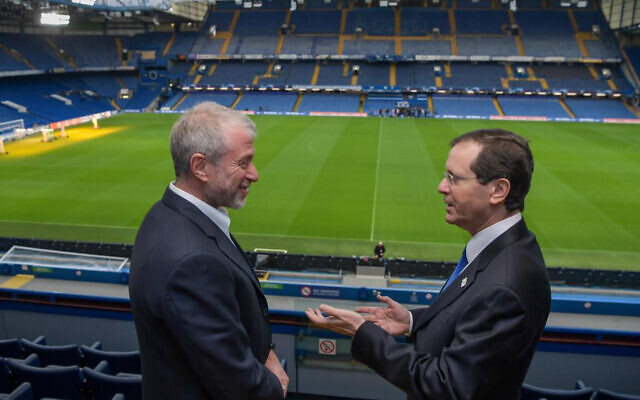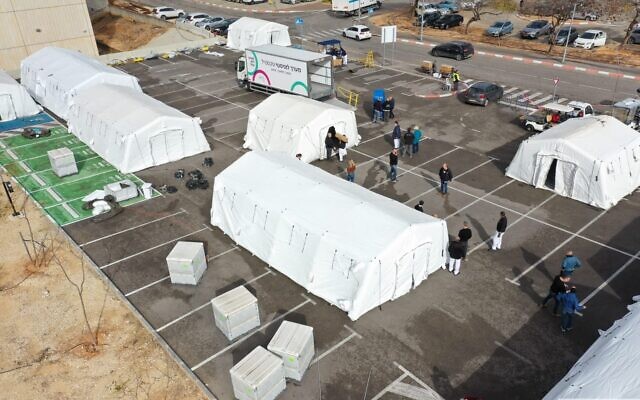Foreign Minister Yair Lapid spoke with his Ukrainian counterpart Dimitro Kuleba on Tuesday and updated him on Israel’s continued efforts to mediate and provide assistance in the ongoing war in Ukraine.
The conversation was “long and positive,” Lapid said.
The phone call came after reports that Kuleba had turned down an appeal to connect to Lapid, reportedly angered at Israel’s carefully balanced support for Ukraine.
“The minister thanks Israel for our mediation efforts and our position in the matter of sanctions,” Lapid tweeted.
Lapid said he updated Kuleba on “the humanitarian aid that Israel has already sent to Ukraine and the field hospital that Israel is sending.”
He added that “Culeba also welcomed our policy of absorbing refugees,” and the two ministers agreed to stay in touch.
In our call, FM @yairlapid Assured me that Israel would not be the route for Russia to circumvent sanctions. Grateful for Israel’s mediation efforts and humanitarian assistance. We discussed ways to end the war in Ukraine. Agreed that the rights of Ukrainians coming to Israel would be respected.
– Dimitro Kuleba (myDmytroKuleba) 15 March 2022
Kuleba himself tweeted about the conversation, saying that Lapid “assured me that Israel will not be the route for Russia to circumvent sanctions.” The Ukrainian foreign minister also said that he was grateful for Israel’s mediation efforts and humanitarian aid, and the pair discussed ways to end the war in Ukraine and “agreed that the rights of Ukrainians coming to Israel” will be respected.”
Prime Minister Naftali Bennett left a cabinet meeting on Monday to have back-to-back phone calls with Russian President Vladimir Putin and Ukraine’s President Volodymyr Zelensky.
A diplomatic official told reporters that talks with Putin lasted about an hour and a half, during which the two men discussed ceasefire efforts in Ukraine as well as efforts to allow Israel access to humanitarian aid.
Bennett has also spoken with Zelensky. many times As Moscow’s troops invade Ukraine, however, the two men have not met in person.

Prime Minister Naftali Bennett (L), Ukrainian President Volodymyr Zelensky (C), and Russian President Vladimir Putin (Combo Photo: AFP)
Lapid announced in Slovakia on Monday that “Israel would not be the route to circumvent the sanctions imposed on Russia by the United States and other Western countries.”
However, Israeli officials told The Times of Israel on Tuesday that Israel was not Currently preparing for the ban On Moscow or Russian oligarchs.
Instead, Lapid’s statements were in line with Israel’s stance on the point, in that it has called for maintaining open lines of communication with both Moscow and Kyiv, while showing support for Western positions without necessarily engaging. .
Israel has stated that it would prevent US-sanctioned Russian oligarchs from keeping their planes and boats in Israel, but noted that it was unable to prevent Russian-Israeli oligarchs, such as Roman Abramovich, from placing their planes and boats in Israel. entering the country,

In this photo released by Israel’s Government Press Office, Chelsea boss Roman Abramovich (left) talks with Israeli President Isaac Herzog at Stamford Bridge on November 21, 2021 in London. (Kobi Gideon/Israel’s Government Press Office via AP)
Cabinet ministers on Monday approved plans to set up an Israeli field hospital in war-torn Ukraine in the coming days.
A government statement said the hospital – under a project called Shining Star – is expected to operate in western Ukraine for a month for fleeing refugees.
Budgeted at NIS 21 million, funding is to come from the Prime Minister’s Office, the Ministry of Health and the Ministry of Foreign Affairs, as well as the Charles and Lynn Schusterman Family Foundation and the American Jewish Joint Distribution Committee.
The hospital will include wards for children and adults, an emergency room, a delivery room and a primary care clinic.

In this handout image from the Ministry of Health published on March 5, 2022, an example field hospital is seen. Israel is sending a delegation to Ukraine to set up a field hospital in the country. (courtesy/shiba medical center, ministry of health)
While Israel has agreed to absorb Ukrainian refugees, it has kept an entry quota of 25,000 people not otherwise eligible for Israeli citizenship – including 20,000 in the country at the start of the war – with criticism both within and outside the government. do.
Interior Minister Aylett Shek announced on Sunday that people fleeing Ukraine and have relatives in Israel would be exempted from entry limits on refugees who are not eligible for Israeli citizenship under the law of return.
Overseas Affairs Minister Nachman Shai, one of several members of the governing coalition opposing the entry cap, called the new policy “too little, too late”.
Tal Schneider and Lazar Berman contributed to this report.
